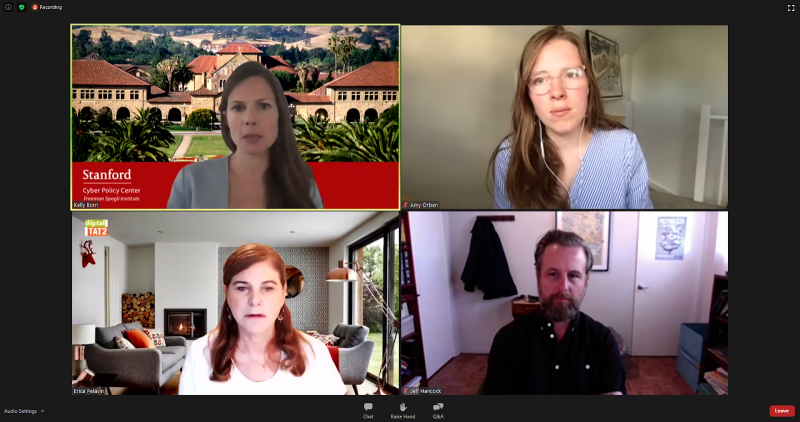The Freeman Spogli Institute’s Cyber Policy Center (CPC) hosted a webinar on July 1 focused on technology and teenage wellbeing in the time of COVID-19. The speakers of the webinar discussed the complex relationship between screen time usage and teens’ wellbeing during COVID-19 lockdown.
The webinar was hosted by Kelly Born, executive director of the CPC, and featured Jeff Hancock, professor of communication and founding director of the Stanford Social Media Lab, Amy Orben, research fellow at Emmanuel College, and Erica Pelavin, co-founder of My Digital TAT2, a Silicon Valley nonprofit focused on building healthy online habits around technology.
Orben said individuals have unique backgrounds and circumstances, so their screen time and satisfaction will differ. She used the analogy of a chocolate bar to explain how screen time can affect different individuals.
“If the adolescent turns out to be a heavy diabetic, that might be really, really harmful and might even be deadly,” she said. “However, if the adolescent just came home from a massive sports match, and they’re really yearning for some food, some energy to replenish their energy levels, then that chocolate bar might be really beneficial for them.”
Orben also stressed the importance of considering the frequencies and motivations of users.
“When we talk about screen time and social media, because it’s not as easy as saying this chocolate bar will harm adolescents, we need to think about the types of users of frequencies and motivations.”
Pelavin’s research for My Digital TAT2 has focused on the impact of the COVID-19 pandemic on the mental health of teenagers. She said that some teenagers have seen improvements in their mental health. Some of the students that she worked with have mentioned that they’re resting from the pressures of school, enjoying the freedom from social anxiety and commitments such as going to prom and some have used this time “to look at new hobbies” and “get to know their families better.”
“Many of them say that their mental health is improving. And I think this is important for us to think about, so that we don’t put our own anxiety onto our kids’ experience,” she said. “But, like always, if you have an existing mental health issue, there are also teens who are finding that this [issue] is amplified from their experience and making it harder for them.”
She added that some teens also experience productivity pressure from social media usage while others have gone through “family tensions” during this time.
Hancock suggested that regulations eventually influence how users manage their screen time. He compared the current moment — with little regulation of screentime — to his childhood, when his parents drove a car without seatbelts, and drinking and driving was more common.
“You think back to it like, ‘deadly time.’ Indeed, it was. But people didn’t want to just give up cars or somehow limit car time,” he said. “Instead, we developed regulations: drinking and driving became illegal; wearing seatbelts was mandatory.”
Hancock also argued that the focus should not be limited to screen time but the impact of technology overall.
“Instead of just thinking about screen time, think about what we can do to maximize the positives and minimize the dangers,” he said.
Contact Vivian Chang at vivianchang2003 ‘at’ gmail.com and Michael Espinosa at mesp2021 ‘at’ stanford.edu.
